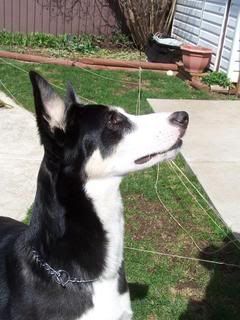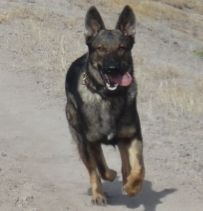 Exercising high energy puppies, and a few other Qs
#365872 - 08/28/2012 10:42 AM Exercising high energy puppies, and a few other Qs
#365872 - 08/28/2012 10:42 AM |
Webboard User

Reg: 03-26-2008
Posts: 251
Loc: NY
 Offline Offline |
|
Hi guys,
I am planning on getting an Australian Cattle Dog or ACD mix in the next month or so (rescue), and have been doing my research for quite awhile, so I know what I'm getting into 
However, I don't have time to responsibly raise an 8 week old pup (mostly do to not having someone to let it out every few hours while I'm at work), even though I wish I did. So, I am going to be looking at older rescue dogs, from ~6 months to 2 years.
1) Now, assuming I get a 6 month old pup, how do you tire them out? I know that a good cattle dog is a tired cattle dog, but I also know you aren't supposed to run puppies too hard. So, how does one balance tiring out a high energy puppy while not damaging the skeleton? I understand that I can do mental exercises, tugging, agility, other things like this, but how do I know when it's too much? How do I know when a walk is too much? What about hiking, how much is too much? How old can I start with a weighed vest?
2) I have done lots of reading on leash training, and I understand the concepts. However, if I am getting an adult dog that needs lots of exercise, what if he isn't good on a leash? How do I exercise him while teaching good leash manners? I don't want him to experience negative feelings with me or the leash, but I don't want him pulling either. I know how to train a dog to not pull using marker training and setting the dog up to not fail, but it will be hard to do that and still need to take it on walks, if it already has bad habits.
3)When a dog is chewing on something you don't want, and you redirect it to toys, doesn't this simply reward the dog for chewing on the "bad" thing? How is this different than giving it a treat for chewing on a shoe? (This question isn't really that important, as I plan on using a crate and tethering the dog to me until it can handle freedom).
4) If a dog is barking in the crate, I know that you simply wait to till it stops to let it out, and ignore the behavior until it dies off. However, what do you do when you HAVE to make it stop, such as if neighbors are complaining (in areas like apartments or condos; this question isn't that important either, just curious as well).
5) Finally, how does anyone have time to raise a little puppy? I can't imagine being able to raise an 8 week old puppy properly without having someone home. Does everyone who raises a little high energy breed work from home or have a stay at home spouse? This is really bugging me, as I desperately want a puppy one day, but I don't see how anyone can do this.
Thanks!
|
 Top Top
|
 Re: Exercising high energy puppies, and a few other Qs
[Re: John Vanek ]
#365873 - 08/28/2012 11:03 AM Re: Exercising high energy puppies, and a few other Qs
[Re: John Vanek ]
#365873 - 08/28/2012 11:03 AM |
Webboard User
 
Reg: 11-04-2008
Posts: 572
Loc: Hampshire, England
 Offline Offline |
|
I've raised a pup while working full time. Initally I took pup to work for the first few weeks, then he stayed at home when I popped back at lunchtime.
|
 Top Top
|
 Re: Exercising high energy puppies, and a few other Qs
[Re: John Vanek ]
#365876 - 08/28/2012 11:27 AM Re: Exercising high energy puppies, and a few other Qs
[Re: John Vanek ]
#365876 - 08/28/2012 11:27 AM |
Webboard User

  
Reg: 12-08-2005
Posts: 1271
Loc: Stoney Creek , Ontario, Canada
 Offline Offline |
|
3)When a dog is chewing on something you don't want, and you redirect it to toys, doesn't this simply reward the dog for chewing on the "bad" thing? How is this different than giving it a treat for chewing on a shoe? (This question isn't really that important, as I plan on using a crate and tethering the dog to me until it can handle freedom).
You aren't rewarding him for the chewing. He has to STOP chewing the unacceptable object in order to take hold of the new acceptable object. You are rewarding him because he stopped chewing the bad item.
so it goes:
puppy chewing on table leg.
You call puppies name and show him the acceptable toy you have for him. If he doesn't move, I toss the toy or move it around in order to make it more appealing to him.
He leaves table leg, so he stopped chewing and is rewarded for leaving the table leg to play with the new toy.
have you read this article:
http://leerburg.com/bitingpuppies.htm
or read this whole section:
http://leerburg.com/articles.htm#puppy
lots of great info there on puppies and older puppies and introducing them into your home

Don't complain....TRAIN!!! |
 Top Top
|
 Re: Exercising high energy puppies, and a few other Qs
[Re: John Vanek ]
#365878 - 08/28/2012 12:49 PM Re: Exercising high energy puppies, and a few other Qs
[Re: John Vanek ]
#365878 - 08/28/2012 12:49 PM |
Webboard User

  
Reg: 12-01-2005
Posts: 1009
Loc: OKC, Oklahoma
 Offline Offline |
|
1) Now, assuming I get a 6 month old pup, how do you tire them out? I know that a good cattle dog is a tired cattle dog, but I also know you aren't supposed to run puppies too hard. So, how does one balance tiring out a high energy puppy while not damaging the skeleton? I understand that I can do mental exercises, tugging, agility, other things like this, but how do I know when it's too much? How do I know when a walk is too much? What about hiking, how much is too much? How old can I start with a weighed vest?
At 6 months, the growth plates are not yet closed and can be damaged fairly easily on a hard surface. If you have a place to swim your dog, that is ideal for a high-energy pup. Fairly low stress on the joints, but really tires them out. Just like with yourself, the pup has to slowly acclimate to long walks or whatever exercise you are doing.
And truly, making their little brain s work is really tiring to them as well.
4) If a dog is barking in the crate, I know that you simply wait to till it stops to let it out, and ignore the behavior until it dies off. However, what do you do when you HAVE to make it stop, such as if neighbors are complaining (in areas like apartments or condos; this question isn't that important either, just curious as well).
Whenever I have had a new pup that fussed in the crate, it was usually bedtime and I'd keep the crate beside my bed so I could hear if they whined and wanted to go out in the night. I would just slap my hand on the top of the crate to startle them quiet for a sec, then say pretty gruffly, "Hush up". I rarely had to do this more than once or twice. This may not be any kind of effective with an older pup or adult dog, but it's a starting point.
|
 Top Top
|
 Re: Exercising high energy puppies, and a few other Qs
[Re: John Vanek ]
#365879 - 08/28/2012 03:41 PM Re: Exercising high energy puppies, and a few other Qs
[Re: John Vanek ]
#365879 - 08/28/2012 03:41 PM |
Moderator

   
Reg: 07-13-2005
Posts: 31580
Loc: North-Central coast of California
 Offline Offline |
|
"Finally, how does anyone have time to raise a little puppy? I can't imagine being able to raise an 8 week old puppy properly without having someone home. Does everyone who raises a little high energy breed work from home or have a stay at home spouse? This is really bugging me, as I desperately want a puppy one day, but I don't see how anyone can do this."
I almost agree. It requires some serious thought way ahead of time.
When I've fostered a puppy (or adopted a non-potty-trained adult) I've had strong backup in the form of experienced paid dog-walkers. An 8-week-old puppy can't be alone in a crate all day long. No puppy can, actually. I'd even go as far as saying that I'd have a two-week vacation lined up for the event as well as the long-term potty back-up.
I'd really like to hear others' take on this, because we have had many threads about new owners challenged by a full-time job and the potty-training issue. And that's just the potty part! There's also (as you said) socializing, bonding, training, exercise. ....
It can be done, but IMO it requires very good planning and all the support in place in advance. It also requires getting up early every single day and getting right home from work every day.
I do work at home now, but I've had plenty of experience with the help needed (and not free help; I don't want the puppy's walker{s} to think that because it's a favor, the task can be short-changed) to get from not-potty-trained to well-trained while working around a full-time job.
And I was always able to come home at noon.
So again, I almost totally agree with what you said. Doing it alone with a full-time job requires planning, hired help, and major sacrifices, for the entire life of the high-energy dog.
JMO!
|
 Top Top
|
 Re: Exercising high energy puppies, and a few other Qs
[Re: John Vanek ]
#365880 - 08/28/2012 01:21 PM Re: Exercising high energy puppies, and a few other Qs
[Re: John Vanek ]
#365880 - 08/28/2012 01:21 PM |
Webboard User

 
Reg: 12-24-2007
Posts: 575
Loc: Texas
 Offline Offline |
|
For exercise: swimming is really good, even if the dog doesnt enjoy swimming initially take the time to introduce it right so it will, it will be really convenient later. Also, if there is an area where it can be on a longline and run around interacting with its environment (like a nice secluded trail) that will sap its mental and physical energy without being hard on its bones.
For the barking, if you get an older dog, you might be able (depending on where you get it from) to have the people who you get it from do the first part of crate training with it, which is the hard part. Afterwards you can still teach your dog to "hush" on command. (Much easier to accomplish if the Pack hierarchy is order 
As for leash manners, you can probably teach those right away if you need to, just take some treats and make the experience fun. Turn it into a training opportunity, no pressure, just operant conditioning.
|
 Top Top
|
 Re: Exercising high energy puppies, and a few other Qs
[Re: John Vanek ]
#365881 - 08/28/2012 02:13 PM Re: Exercising high energy puppies, and a few other Qs
[Re: John Vanek ]
#365881 - 08/28/2012 02:13 PM |
Webboard User

Reg: 01-19-2012
Posts: 685
Loc: whistler bc ca
 Offline Offline |
|
hey john , i've got some observations . . .
first comment i have is : does this breed match your lifestyle ?
even after the dog has matured , and been taught the behaviours it needs to get along , do you see yourself with the time and energy for the relationship to flourish over the long term ? i guess what i am asking is , if you don't have the time and resources to develop the dog now , how will you manage it later ?
i am in a unique situation in that my employer fully supports me and the training of my dog , primarily because they benefit directly from his presence on the mountain and in the community . even so , i transferred myself from one department to another , took a demotion and small pay cut so that i could dedicate more time to his development . in short , i made changes to my life to make it happen .
is it possible for you to have the dog crated at your workplace , or at least in your vehicle , so that you can attend to him for short periods throughout the day ?
as for the exercise , there are alot of variables to consider : you can run a young dog too hard in five minutes , by asking ( or forcing ) them to do things they aren't physically ready for , or you can take a young dog out for a leisurely four hour hike in the right environment with lots of stops to do some engagement work and just enjoy each others' company . if you observe your dog carefully , you can learn to read when they have had enough , either from a training perspective , or just plain physical energy .
i have no experience with a weighted vest , but common sense would tell me the dog has to be fully matured physically before i'd put any additonal weight on him . maybe get him used to wearing an un-weighted vest first . beyond that though , i'd use other activities to tire him out , if that is your goal .
like everything else , the leash work starts small and short . use a long line or flexi-lead for your walks in appropriate locations mixed in with short heeling drills throughout the walk . pick good spots that match your expectations with the dogs' ability .
hope some of that helps . . . can i assume the dog in your sig is a dog you already own ?
dogs : the best part of being human |
 Top Top
|
 Re: Exercising high energy puppies, and a few other Qs
[Re: John Vanek ]
#365882 - 08/28/2012 03:40 PM Re: Exercising high energy puppies, and a few other Qs
[Re: John Vanek ]
#365882 - 08/28/2012 03:40 PM |
Moderator

   
Reg: 07-13-2005
Posts: 31580
Loc: North-Central coast of California
 Offline Offline |
|
Really good post, Ian, IMO.
I applaud the O.P. for asking these questions that way too many people don't think about in advance ..... and then the high-energy puppy (or dog) is always the one who suffers when the huge commitment required becomes apparent.
|
 Top Top
|
 Re: Exercising high energy puppies, and a few other Qs
[Re: Wendy Lefebvre ]
#365883 - 08/28/2012 04:19 PM Re: Exercising high energy puppies, and a few other Qs
[Re: Wendy Lefebvre ]
#365883 - 08/28/2012 04:19 PM |
Webboard User

Reg: 03-26-2008
Posts: 251
Loc: NY
 Offline Offline |
|
@ Wendy: Thank you, that makes sense. I have read those articles. I do know that redirection works, as I have used it in the past. I was mostly interested in the "why" it works, but I worded it poorly 
@ Becky and Mary: Thank you for the swimming suggestion. I have heard this, and it makes perfect sense, but alas, I do not have a pool, and winter is coming. While I will certainly utilize swimming when I can, I would not be able to do this daily.
@Ian: Thank you for the topical questions and thoughts. To answer your question, yes, I am certain this breed is the one for me. I am looking for an active, rugged breed that can come to work with me. I am a graduate student in wildlife biology, and I need a dog that is OK coming into the field with me, and working long hours, while being trainable enough to be under control, and somewhat heat tolerant.
In addition, I am hoping to train the dog to help me with my work, by finding snake and/or turtle nests and adults, in similar fashion to the work of this organization: http://conservationbiology.net/conservation-canines/
In addition, I will be living with a few people who work at different hours than I do, and have already stated they would be willing to help let the dog out when I am at class/work. My schedule has me working 3 days a week right now, and the rest of the time from home.
I have experience training dogs, but as this one will be MINE, I have actual control over everything, and and just hoping to cover some burning questions in my mind.
The dog in my sig was my childhood dog, a border collie/ACD cross. I trained him in agility, and he knew many commands. Unfortunately, he passed away a year and a half ago at the age of 14.
@ Connie: Thank you for your input as well. As you seem to be well read on many subjects, do you have any references I could look into as to the skeletal developmental of dogs/ when growth plates close etc/ what exercises are too damaging, or rather anything in this regard?
What about throwing the tennis ball or Frisbee up a hill? I guess my main "concern" is how to reduce exercise time, without being skeletally stressful. Also please don't think I'm trying to be lazy, I just like being efficient, and while I have no problem playing iwth a dog for 4 hours a day (I've done this), sometimes only 3 hours will be feasible (ie, rain, blizzard, etc :grin  , and obviously not 3 hours all at one time.
My other concern is that unlike some other breeds, cattle dogs are KNOWN for working harder than they can, and physical injuries are actually one of their most common ailments.
Thank you all for your questions and suggestions. I realize I'm probably being a worry wort, but this is the nerd in me coming out.
|
 Top Top
|
 Re: Exercising high energy puppies, and a few other Qs
[Re: John Vanek ]
#365888 - 08/28/2012 05:20 PM Re: Exercising high energy puppies, and a few other Qs
[Re: John Vanek ]
#365888 - 08/28/2012 05:20 PM |
Webboard User

Reg: 01-19-2012
Posts: 685
Loc: whistler bc ca
 Offline Offline |
|
sounds like a great situation for you and the dog john .
if i may , i respect anyone who takes a dog out of a rescue to give it a better life . that is noble and hopefully a good situation for both dog and human .
having said that , i'd have a bit of trepidation going to a rescue to get a dog that you will be , in essence , depending on to help you do your work .
i'll grant that any dog from any source is a bit of a leap of faith , but you can certainly improve the odds in your favor by dealing with a breeder whose reputation is resting on the working ability of the dogs they produce and sell .
on the one ( rescue ) hand , there is a certain appeal to a rescue dog , aside from the life-saving you might be doing . knowing nothing , or very little about the dogs' past frees you from any pre-conceived notions or expectations you might have about the dog . . . " i don't know you , you don't know me , but we're going to work on this together and make a life with each other ". but that lack of knowledge can be a liability as well . certain possibly undesireable physical and behavioural traits may show up later in life , particularly in an older dog , who may be bringing " baggage " from his past , as well as questionable genetics .
on the other ( breeder ) side of the discussion , you will specifically determine what attributes you want in a dog , and then seek out a breeder who will be proud to offer you a dog who will meet your requirements to the best of the dogs' ability . being able to see both parents , hopefully in their working environment , will give you a pretty accurate picture of the dog you will wind up with .
good breeders are developing dogs for a purpose in the best interest of the breed , rescue organizations try to make the best of a not ideal situation . . . both are worthy of respect .
as i've already tipped my hand , i fall into the breeder side of the discussion because i like the idea that not only am i seeking a companion , but a partner that i'll be working with for the duration of the dogs' career . although not exactly the same as purchasing tools for the job , i like to know that i've done what i could to give myself the best chance at success and even though finding turtle eggs is not the same as finding avalanche victims , they are both important jobs that we want to be successful at .
good luck with whatever route you decide , i wish you and the dog the best .
dogs : the best part of being human |
 Top Top
|
When purchasing any product from Leerburg Enterprises, Inc. it is understood
that any and all products sold by Leerburg Enterprises, Inc. are sold in Dunn
County Wisconsin, USA. Any and all legal action taken against Leerburg Enterprises,
Inc. concerning the purchase or use of these products must take place in Dunn
County, Wisconsin. If customers do not agree with this policy they should not
purchase Leerburg Ent. Inc. products.
Dog Training is never without risk of injury. Do not use any of the products
sold by Leerburg Enterprises, Inc. without consulting a local professional.
The training methods shown in the Leerburg Ent. Inc. DVD’s are meant
to be used with a local instructor or trainer. Leerburg Enterprises, Inc. cannot
be held responsible for accidents or injuries to humans and/or animals.
Copyright 2010 Leerburg® Enterprises, Inc. All rights reserved. All photos and content on leerburg.com are part of a registered copyright owned by Leerburg Enterprise, Inc.
By accessing any information within Leerburg.com, you agree to abide by the
Leerburg.com Privacy Policy and Terms of Use.
 Previous Topic
Previous Topic Index
Index Next Topic
Next Topic













 Top
Top









